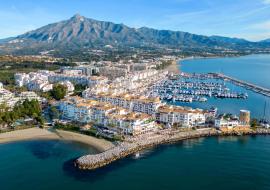Remittances to Latin America, the Caribbean to Reach $55 Billion in 2005
Latin American and Caribbean migrants will send around $55 billion to their countries of origin this year, according to estimates released last week by the Inter-American Development Bank´s Multilateral Investment Fund (MIF).
The MIF, an autonomous fund administered by the IDB, had said earlier this year that remittances to this region could reach $50 billion, up from $45 billion in 2004.
According to the MIF, Mexico stands to receive some $20 billion this year. Central America and the Dominican Republic, taken as a group, will collect around $12 billion, while Andean countries that receive remittances (Bolivia, Colombia, Ecuador and Peru) will grab some $11 billion. Brazil and various Caribbean nations will also see significant inflows.
These remittances are made in small amounts (typically between $50 and $300 at a time) by migrants living in the United States, Europe and Japan, although there also are significant flows between Latin American countries, said MIF Manager Donald F. Terry.
“Remittances reflect the reality of labor markets not only in the Western Hemisphere but in the entire world,” Mr. Terry said. “It´s established that these flows are a crucial source of income for millions of families. What we need now is to create the right conditions for this money to have a greater impact on poverty reduction and economic development in migrants´ countries of origin.”
Some 25 million adults born in Latin American and the Caribbean live and work outside their homelands, mostly in industrialized nations with low birth rates and a growing demand for labor. However, economic migration also happens between Latin American countries, as is the case in Argentina and its less developed neighbors.
Bolivians, Paraguayans, Peruvians and other Latin Americans living in Argentina send some $500 million a year, while Argentina receives around $800 million from its own migrants residing in the United States, Spain and Italy, said Manuel Orozco, a researcher with the Inter American Dialogue think tank in Washington, DC.














